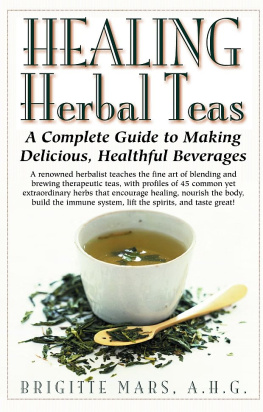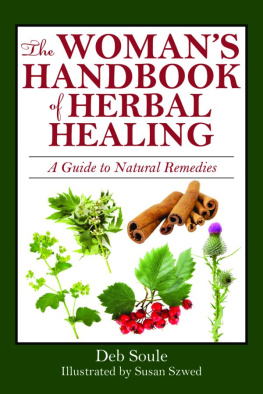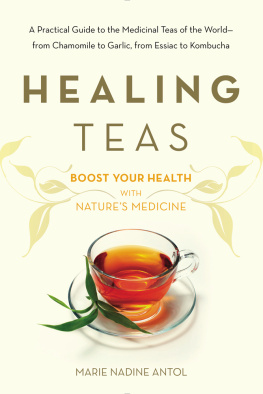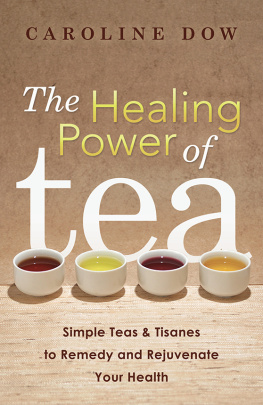Acknowledgments
Thank you for supporting yourself by drinking herbal tea and reading this book!
I have a truly blessed creative life, and I get to work with plants in the most glorious ways. But my work would not be possible without the consistent support of my friend, David Balatero. Thank you for your kindness, humor, and deep moral support. You are continually thoughtful, and your unique perspectives and passionate music inspire me all the time.
My amazing sister, Rebecca Zollinger, is also profoundly important to my herbalism journey. An herbalist herself, she introduced me to tea making and herbalism many years ago. Her deep love and gratitude for plants and their influences on the human body continue to inspire me. She is a woman of science, with a full maternal love and spirit for what is within and beyond her own skin. This book could not have been written without her faith in my work.
My parents example taught me that with patience and persistence I can grasp both the large and small things I encounter in life. Thank you for all the love and wisdom you have shared! I love you!
My editor, Hannah Fries, was as much a teacher as an editor. She helped me better understand the process of book creation from start to finish. She was incredibly generous and kind.
And finally, I may never have considered writing a book if it werent for Deborah Balmuth, the woman who planted the seed. I love being able to share what I do with a broader community. Thanks to your belief in me, I am inspired to continue to write. Deborah, I am deeply appreciative of your consistent support!
Contents
Introduction
When you lean in and take those first deep breaths after preparing a cup of tea, you are tuning your senses to the energy and fragrance of nourishing botanicals.
Humans in just about every civilization worldwide have experienced that moment of bliss, hovering over a cup of herbal tea. We physically and emotionally respond to the chemistry of botanicals, and so did our ancestors the joy and familiarity of drinking herbal tea is embedded in the fabric of our genes and cultures. The human body evolved along with a vast botanical pharmacy, and herbal teas were among humanitys first medicines. When we commune with herbs in the pure form of tea, we participate in a long legacy of relationship between humans and nature in all its glorious complexity.
Making and drinking herbal teas for comfort and health is an ancient tradition that anyone can learn. It is both sensual and intuitive, a thoughtful process in which we look, smell, touch, and taste the herbs. As we develop our sensual palate, the flavors, texture, and fragrance of an herb begin to tell us a story of its remedial properties.
The Power of Plants
Plants connect with myriad other organisms through their root systems, leaves, flowers, and seeds. These connections increase their resistance to disease, aid in pollination and seed dispersal, and help increase nutrient uptake. Plants also create special chemical compounds to communicate with other organisms in their vicinity, exchanging information about the constantly fluctuating conditions in the environment. With their above- and below-ground connections they are able to thrive and help a diversity of others thrive as well. Mutually beneficial partnerships are what create stability and resilience in the landscape.
Like plants, our bodies need to be part of an interconnected community, too. Our physical and emotional health depends on knowing and communicating with our environment. Herbal teas simple infusions of healing herbs in water offer a daily reminder of our place in nature and open our hearts and minds to the ways in which plants can realign us.
We rely deeply on the plant kingdom for nourishment, medicine, oxygen, ecological stability, and clean drinking water. By learning to observe, tend, and use healing plants, we gain insight into their ecological roles both inside our bodies and out in the landscapes from which we harvest them. No special genius is needed, just interest and attention.
Learning from Those Who Came Before
Direct relationships with a landscape shape the needs of the people who depend on that landscape for food and medicine. And, in turn, the actions of the people shape the needs of the landscape. If we look closely, we all participate in a cycle of reciprocity. The landscape draws us in and begs us to learn how to tend her; in exchange we are given long-term access to some of natures most healing and profoundly comforting plants. We can learn to modify our actions to meet the needs of our place and let the abundance of where we live fulfill us physically and emotionally.
Before centuries of colonialism, indigenous communities naturally embraced the patterns of nature in order to survive; they knew how to use their regions biodiversity to find nourishment, maintain health, and treat imbalances. By our standards, since every member of society was fluent in the language of plants and could generally manage their own health, everyone would have had the basic skills of an herbalist. Food and medicine were intricately connected to place.
Indigenous communities inhabited the Puget Sound long before my family moved here. The unique range of native edible and medicinal species evolved alongside these people, and the techniques they developed for tending the diverse ecosystems of the Puget Sound are part of a rich cultural heritage. Therefore, when I am out wildcrafting herbs and fruits for teas, I am practicing an ancient skill that indigenous cultures in my area have performed for thousands of years. Although my goal is to honor life and be part of a community that appreciates and supports all the local biodiversity, my opportunities are shaped by a history of colonialism, land-use choices, and a culture of entitlement. I must work to create a new culture that ensures a different legacy for this place I love.
Those of us who are not indigenous and feel spiritually shallow (or hungry) often admire the earth-based spiritual practices of indigenous peoples. It might seem enticing to identify and cloak ourselves with the teachings of these cultures to compensate for our own feelings of emptiness and grief from being part of a culture that prides itself in ecological dominance. But we must learn to teach ourselves new ways to heal the wounds of our violent history, while honoring but not appropriating indigenous culture.
As I learn skills that enable me to become an herbalist and land steward, I try to be mindful of the indigenous roots of these skills. Part of learning about a place is grappling with its uncomfortable history and not ignoring it. But there are many ways to nurture our people and the earth, and time spent loving nature and connecting to plants will naturally bring those ways to light.
A Philosophy of Place and Healing
Herbal foods and teas can teach us how to nurture both our internal and external environments. In the four years I have owned Harbor Herbalist and Birds Eye Tea I have witnessed dramatic positive changes in the herbal tea community where I live. Most of my customers reside in the Puget Sound area where cool, damp winters make way for the lush, foliated landscapes of summer. The beauty and uneven terrain of the Puget Sound seem to instill a fondness for innovation, creativity, and adaptability in our cultural identity. We enjoy a healthy seasonal balance of introspection and outdoor activity. An awareness and appreciation for our special ecology give support to a robust network of local seafood and farms. There is a growing community with a desire to become part of a more sustainable culture that builds strong bonds between local organic producers and consumers.











